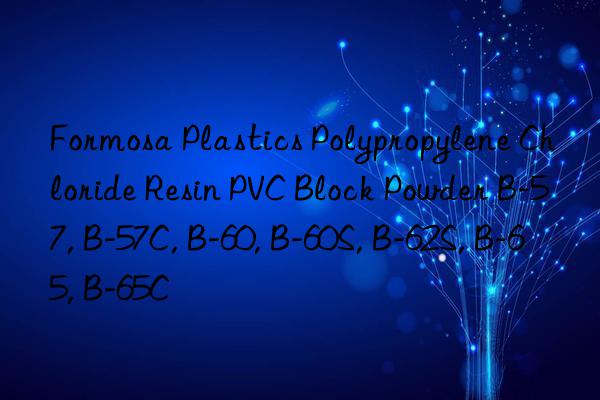
Products Composition
Polyvinyl chloride resin (PVC), English name Polyvinyl Chloride, is made of chlorine A polymer formed by free radical polymerization of ethylene monomer, with a chlorine content of about 57wt%.
PVC is one of the earliest resins to realize industrialization. It is cheap, and its usage in construction materials, people's livelihood and other application fields is increasing day by day, and its demand is increasing rapidly. It is one of the five general-purpose resins.
Products Features
1. PVC molecules are entangled and contain polar groups of chlorine atoms, so that The intermolecular forces are strong, and this structure improves the rigidity, hardness, and mechanics of PVC processed products, and endows them with excellent flame retardant properties.
2, PVC resin main chain contains chlorine atoms between two adjacent carbon atoms And hydrogen atoms, causing PVC to easily degrade under the action of light and heat to form hydrogen chloride (HCL) gas.
3. Performance of PVC:
(1) General performance:
PVC is a white powder with a relative density of 1.35-1.45 (g/cc), The softness and hardness of the processed products can be made into products with widely different softness and hardness by the amount of plasticizer added during processing.
(2) Mechanical properties:
The tensile strength of PVC increases with the increase of the degree of polymerization, but PVC The amount of plasticizer added in different materials has a great influence on the mechanical properties. Generally speaking, as the content of plasticizer increases, the mechanical properties decrease, but the elongation at break increases.
(3) Thermal properties:
The glass transition point temperature of PVC is 80-86℃, PVC resin is at 140℃ That is to say, it begins to decompose and produce HCL, which accelerates rapidly to 180°C. Generally, the melting temperature of PVC is 160°C.
(4) Electrical properties:
PVC is a kind of excellent electrical insulation, the volume impedance value is higher than 10^ 14, but the volume impedance is easily affected by the types of processing additives and additives.
(5) Chemical resistance
PVC is resistant to most inorganic acids (except fuming sulfuric acid and concentrated nitric acid), Alkali, most organic solvents (ethanol, gasoline and mineral oil) and inorganic salts, suitable as chemical resistant materials. However, PVC is easy to swell or dissolve in esters, ketones, aromatic hydrocarbons and halogenated hydrocarbons, and the best solvents are tetrahydrofuran and nitrobenzene.
Products Advantages
PVC quality is stable, PVC supply is stable, and it complies with international environmental regulations.
Products Category
| model | Features | purpose |
| B-57 | Ultra-low degree of polymerization, excellent gelling property, excellent fluidity after gelation, good transparency | Suitable for highly transparent hard products, hard boards, complex pipe fittings, building materials, floor tiles,��Plate, injection molded product |
| B-57C | High false specific gravity, good porosity, less concentrated fine powder, suitable for chlorinated polyvinyl chloride process | Suitable for gas-solid phase method |
| B-60 | Excellent gelling property and high transparency | Hard tape, hard board, pipe fittings, building materials, wire plugs, packaging materials, floor materials, shrink film, foaming, container blowing, highly transparent hard products |
| B-60S | Excellent gelling property and high transparency | Hard tape, hard board, pipe fittings, building materials, wire plugs, packaging materials, floor materials, shrink film, foaming, container blowing, highly transparent hard products |
| B-62S | Excellent gelling property and high transparency | Applicable to foam window frames, hard boards, pipe fittings, building materials, wire plugs, packaging materials, diabncai |
| B-65 | It has the characteristics of high false specific gravity, which can improve the productivity of hard extruded pipe fittings | Suitable for large diameter pipe |
| B-65C | High false specific gravity, good porosity, less concentrated fine powder, suitable for chlorinated polyvinyl chloride process | It is suitable for the production of chlorinated polyvinyl chloride by the gas-solid phase method and the aqueous phase method of chlorinated polyvinyl chloride. |

 微信扫一扫打赏
微信扫一扫打赏

